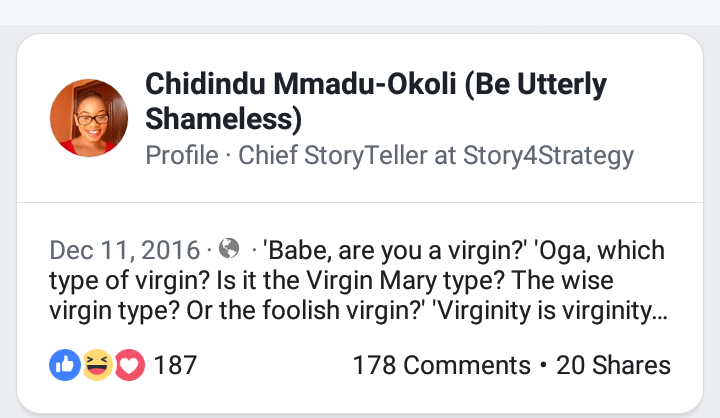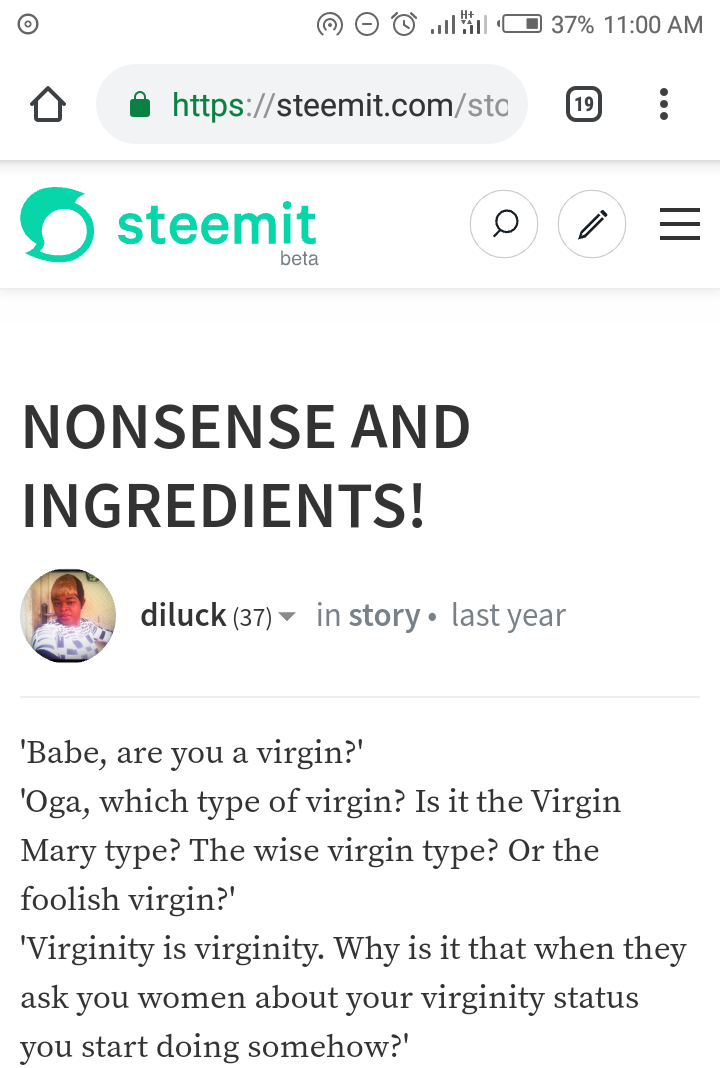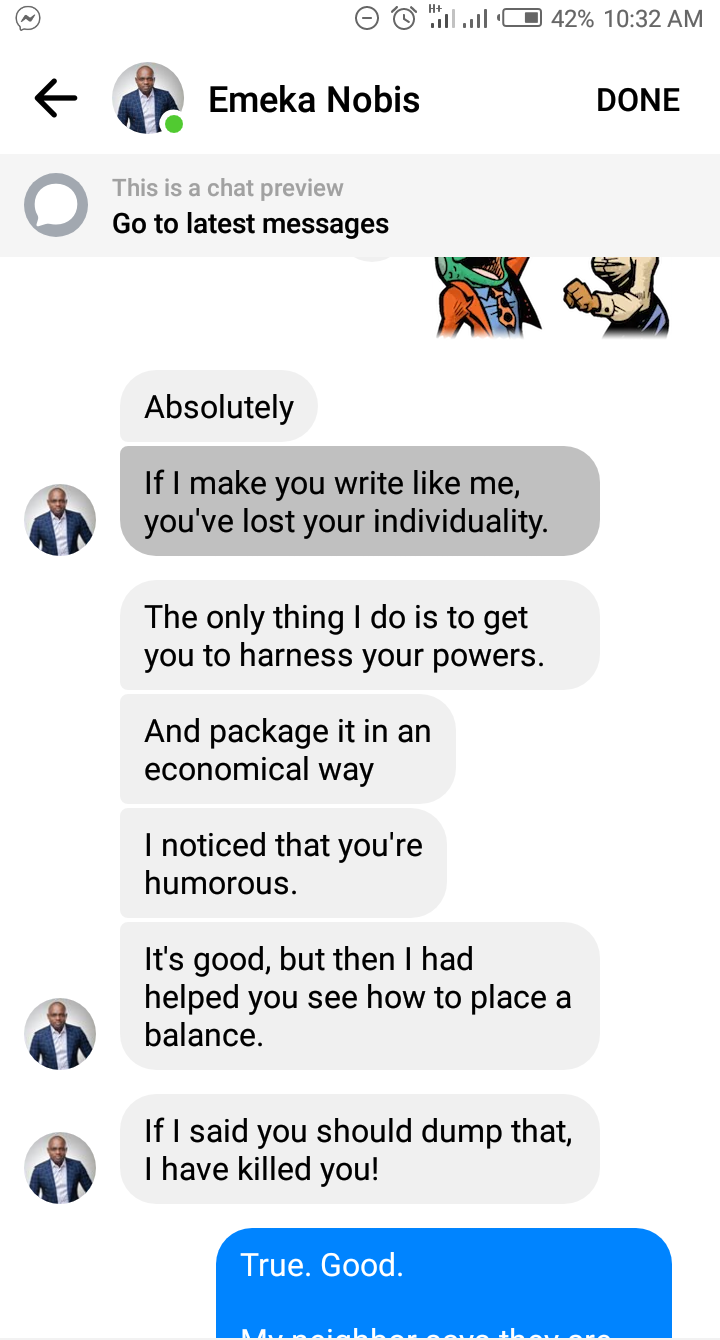 Picture Source: Pixabay“If I make you to write like me, I would have killed your individuality.” –Emeka Nobis.
Picture Source: Pixabay“If I make you to write like me, I would have killed your individuality.” –Emeka Nobis.
One of the decisions I have made in 2019 is to live alone. Well, alone here could mean many things. I mean, I started living away from family since 2001 when I got into a boarding secondary school owned by the Nigerian Air Force. I would travel each holiday for at least 14 hours to see my parents. In 2007, when I began my undergraduate studies, I lived on campus, 4 hours away from home. Thereafter, I have had and lived with housemates.
Alone means a single individual occupying a room, taking responsibility for her own decisions and accepting the necessary consequences. It means being the first to help myself before depending on others for the help. It is a tough decision, but I know it is the little grooming I need to prepare for the next stage of my life.
On several occasions, I would hear the voice of my mother vividly. One day whilst doing dishes and cleaning up my small kitchen space, I noticed that the fresh pepper I had bought the week before had gradually gone rotten. I couldn’t use it anymore. I felt really bad. So, bad that the only thing that admonished me was the voice of my mother in my head. I heard it in the typical Nigerian voice:
“You need to wake up o, Chidindu. This your lack of attention to detail is gradually getting out of hand. How could you allow a whole 50 Naira pepper to go bad in this economy. Do you know that some people don’t have any to make meals with?”
After, I heard these words I just felt sorry to the universe for wasting the seeds that its soil bore. I also forgave myself and I moved on.
…But not without a lesson. My mother’s voice still remains the original voice that I would gladly respect, obey or pay attention to. Perhaps, it is because I have heard it for almost three decades of my life that if I sat within the living room in my family house, I could hear her voice or feel her presence 6 or 7 flats away.
This is the first lesson that I have carried into my life as a writer. The power of voice and originality can only come from the consistency of its usage in inspring, educating, entertaining and persuading. This same uniqueness I bring to every piece I write. I have had people share stories with me that they guessed I wrote, and it turned out to be true. This is a familiar experience I have also had with other writers whose works I have read consciously and consistently.
Three months after I signed up to Medium, I can connect with pieces written by Ayodeji Awosika, Ryan Holiday, etc. I would click directly on their profiles and read their free stories that interest me. I recall that I also had to bookmark some of their pieces to wait to read for free the next month. Specifically, there is always something about ‘Deji’s (Ayodeji) pieces that a Nigerian sister like me can relate to –they give you that arise-and-do-the-next-thing feeling in spite of the daily drama of living here.
Truth is most readers connect with writers they have consistently read from for a considerable number of time. Readers who constantly engage with a writer will always get familiar with their voice.
On one occasion, the first version of Are You A Virgin, a piece I wrote to challenge some of the misconceptions and pressure that African society puts on women of marriageable age. The story went viral.
 Screenshot of the first version of “Are You A Virgin” , published on my Facebook Profile
Screenshot of the first version of “Are You A Virgin” , published on my Facebook Profile
With the feedback and reactions from my readers, I knew that it was not just about the story. It had something to do with me. Most people were comfortable that I became their mouthpiece for gender bias. A few were indifferent. But I felt at peace because I had first expressed myself in the most unique way I knew.
However, I learnt that people do not just value the writer’s opinion, the value the guts of the writer.
Which leaves a question, would a writer’s guts still be admired or hated if such a writer had decided to hide under the cloak of another?
A few months later, someone drew my attention to my piece on Steemit.
 Screenshot of the first version of “Are You A Virgin” plagiarized by an unknown writer on Steemit.
Screenshot of the first version of “Are You A Virgin” plagiarized by an unknown writer on Steemit.
As a writer whose creativity stems from reading and drinking from the collective intelligence expressed in the pieces of other writers, I have on few occasions figured out the voices of these social media writers enables me identify their works, even when some lazy people plagiarize it on their social timelines.
This thing that makes a writer’s piece stand out in the crowded digital space is the writer’s voice. The writer’s voice is a product of the consistent quest to maintain authenticity.
Unfortunately, most writers on the digital space experience struggles with being authentic and creating original pieces that reflect their voices. It is often sad when I receive messages from people who say, “I want to write like you.”
In Nigeria, for instance, we have lots of young writers aspiring to write like Chimamanda Adichie, Late Chinua Achebe or Prof Wole Soyinka. I would understand it if they aspired to write so well that they grew to seize the same platforms, which these people had seized or earned. The danger here is aspiring to write like them. I have never believed in that.
The dangers of not finding and using your unique voice as a writer are immeasurable, but there are a few of which pose greater consequences to the writer.
1. You strip yourself of the power of your originality
“If I make you write like me; I would have killed your individuality.” — Emeka Nobis.
Emeka Nobis said this to me during an online coaching session with him. As a writing coach, he believed that it was important to tell me a few things to expect at the end of that session. Based on his experience working with other writers, he often had to reiterate to his students that his job was to help them express their uniqueness, and not to express his own uniqueness through them.
 Screenshot from an online coaching session with Emeka Nobis via Facebook Messenger
Screenshot from an online coaching session with Emeka Nobis via Facebook Messenger
Let’s assume that everyone or every writer aspired to write like Achebe, Soyinka or Adichie. Would we not be bored of reading the same people? What would happen to the spice that variety brings?
Variety comes when different writers choose to accept their individuality, so that they can express that unshakable authenticity through their original pieces.
2. You suffer a writing-related identity crisis
The dangers of aspiring to be or write like another whom we consider as “the expert writer” is that we fall into an inner chaos. It is like becoming the electrical equipment drawing up current from a unstable source. The voltage is expressing its highs and lows and we are just being stringed along. You should know that no writer is perfect. We all have our high and low moments.
The expert writers you are trying to be like are also evolving. I do not even feel comfortable with addressing people as expert writers because our writing journeys require that we embrace constant change and innovation; otherwise, we fall into the dangers of living constantly in our past glories.
You suffer an inner crises, a writing-related identity crises because you are trying to imitate people who are constantly evolving without taking time to figure out your why.
These people have figured out theirs and have seen the constant need to get rid of things from their writing history or personalities that no longer work. If you do not take time to figure out what makes you unique, what works and what does not work, what specific examples to learn from these people, you will always be at war with yourself. The moment they shift their course, you will shift yours without understanding why –until you end up in an accident.
Accident? Well, yes! That’s what happens when a fish decides to leave the waters, so that it can fly with the birds.
3. You deny the world a chance to learn from you
Personally, I believe that no one is self-made. We are all products of other people’s breaths of kindness. Go through history. Check out the back stories of every great man or woman. There are no self-made people. We only have people inspired by the thoughts, word and deeds of another to pursue greatness. These people are on the platform because their names were mentioned or announced by others.
I have had real experiences of people doing the things they thought they would never do, by first reading my stories. Imagine for a second that I though myself as not good enough and decided to hide under the shadows of established writers…
The same thing applies to you too. If you lose your authenticity, you deny the world the opportunity to drink from the impact of your own voice.
If you lose your individuality, you don’t just become voiceless, you become the echo of the voices of other writers.
If you cease to embrace your originality, you become another town-crier –echoing the words of the authority or king-man — yet without having any authority.
The world gravitates to people of authority –who have understood their words as power-set required to impart and not impress them.
4. Gradually, you lose your audience
Authenticity always wins because the mind of the reader or listener cannot be manipulated. They know when they have seen the same words or style in other pieces. Gradually, they may say to themselves, “What’s the need reading from this writer?”
The writer who lacks originality is often afraid to squeeze out his creative juice. By this, he takes his audience of readers for granted. Since he does not challenge them enough to keep their minds on his words, his readers will click the next link or swipe to the next story. Gradually, her loses the power to influence his audience.
So, what else do you think is the consequence of struggling to write like someone else, like the writing expert is your niche? Feel free to share. You can also learn the basics of storytelling here.
 Helping each other write better. Join Us.
Helping each other write better. Join Us.
The Dangers of Aspiring to Write Like the Experts was originally published in The Writing Cooperative on Medium, where people are continuing the conversation by highlighting and responding to this story.
Read more: writingcooperative.com
